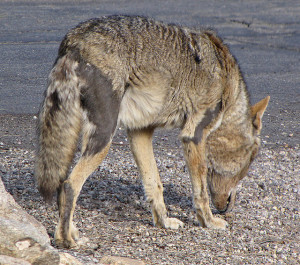
Coyote with mange suffers from hair loss. (Photo credit: SearchNet Media, flickr.com)
Sick coyotes are more likely to seek easily accessible food sources such as garbage in developed areas according to a new study. Across North American cities reports of coyote-human problems have increased, and biologists are trying to understand why.
The authors used GPS collars to follow 19 coyotes in the Edmonton area. Half of the coyotes were infested with a mite (sarcoptic mange) that causes hair loss.
The researchers found that these sick coyotes were more active during the day, and more likely to frequent developed areas than the healthy coyotes. The diseased coyotes also ate more low-quality, easily accessible food than the healthy coyotes which usually ate berries and small mammals.
To help keep human-coyote interaction down, researchers recommend that neighbourhood compost, birdseed and garbage be made inaccessible to the coyotes and ask wildlife managers to treat sick coyotes to help decrease their need for easily accessible food.
Original research paper published in Proceedings of the Royal Society B: Biological Sciences on April 13, 2015.
Names and affiliations of selected authors
